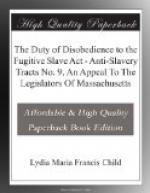In the same debate, Mr. Maxson, of Allegheny, said:—“All laws, whether Constitutions or statutes, that invade human rights, are null. A community has no more power to strike down the rights of man by Constitutions, than by any other means. Do those who give us awfully solemn lessons about the inviolability of compacts, mean that one man is bound to rob another because he has agreed to? In this age of schools, of churches and of Bibles, do they mean to teach us that an agreement to rob men of their rights, in whatever solemn form that agreement may be written out, is binding? Has the morality of the nineteenth century culminated in this, that a mere compact can convert vice into virtue? These advocates of the rightfulness of robbery, because it has been agreed, to, and that agreement has been written down, have come too late upon the stage, by more than two hundred years. Where does the proud Empire State wish to be recorded in that great history, which is being so rapidly filled out with the records of this “irrepressible conflict”? For myself, a humble citizen of the State, I ask no prouder record for her than that, in the year 1860, she enacted that the moment a man sets foot on her soil, he is free, against the world!”
Wendell Phillips, one of earth’s bravest and best, made a speech at Worcester, 1851, from which I make the following extract:—“Mr. Mann, Mr. Giddings, and other leaders of the Free Soil party, are ready to go to the death against the Fugitive Slave Law. It never should be enforced, they say. It robs men of the jury trial, it robs them of habeas corpus, and forty other things. This is a very good position. But how much comfort would it have been to Ellen Crafts, if she had been sent back to Macon, to know that it had been done with a scrupulous observance of all the forms of habeas corpus and jury trial? When she got back, some excellent friend might have said to her, ’My dear Ellen, you had the blessed privilege of habeas corpus and jury trial. What are you grieving about? You were sent back according to law and the Constitution. What could you want more?’ From the statements of our Free Soil friends, you would suppose that the habeas corpus was the great safeguard of a slave’s freedom; that it covered him as with an angel’s wing. But suppose habeas corpus and jury trial granted, what then? Is any man to be even so surrendered, with our consent? No slave shall be sent back—except by habeas corpus. Stop half short of that! No slave shall be sent back!”




